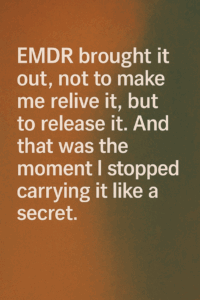Getting sober made me feel like I was walking around without skin. I thought the hard part was quitting. But what hit harder was everything underneath—the panic, the memories, the stuff I swore I was “over.”
Then someone mentioned EMDR. And I was like… eye movement therapy? Really? But it turns out, EMDR wasn’t about looking weird—it was about healing deep. And it worked in a way that nothing else had.
1. I Thought It Was “Old News”
I came into therapy thinking, “Yeah, some stuff happened—but it’s not like I had it that bad.” I minimized everything. Trauma, for me, meant something dramatic. And since mine didn’t feel “big enough,” I assumed it wasn’t still affecting me.
But my body was telling a different story—through anxiety, nightmares, and this constant edge I couldn’t explain. EMDR helped me connect the dots between then and now.
2. EMDR Wasn’t Hypnosis or Woo-Woo
I honestly thought I’d have to stare at a spinning object or be hypnotized. But EMDR is structured, grounded, and weirdly gentle. You focus on a memory while doing specific movements (like tapping or watching light move). That’s it.
But something about it makes your brain go, “Okay, we can actually process this now.” It doesn’t erase the memory. It just takes out the sting.
3. I Didn’t Know I Was Still Holding It
During one session, a memory surfaced that I hadn’t thought about in years. I’d buried it so deep, it felt like someone else’s story. But there it was. And suddenly, so many things made sense—why I didn’t trust people, why certain smells made me freeze.
EMDR brought it out, not to make me relive it, but to release it. And that was the moment I stopped carrying it like a secret.

4. It Helped Me Feel Safe in My Own Head Again
Early sobriety is loud. Your brain is adjusting, your emotions are raw, and the past starts echoing louder than ever. EMDR didn’t quiet everything immediately—but it helped me stop panicking at my own thoughts.
That was the turning point. When I could sit with my memories and not feel hijacked, I knew I was finally healing.
5. It Wasn’t Like Group or Talk Therapy—It Was Trauma Treatment, and It Felt Different
I’d done group therapy. I’d vented in one-on-ones. Both were helpful, but EMDR worked in another gear. It wasn’t about retelling my story over and over or analyzing every emotion. It was about letting my brain finish what it never got to finish.
Talk therapy gave me insight. Group therapy gave me community. But EMDR gave me relief. It helped me heal on a body-deep level. Not just understand—but actually feel free.
6. I Realized I Wasn’t Broken—I Was Still Wounded
One of the hardest things about trauma is how it makes you feel defective. Like you’re reacting “too much” or being “too sensitive.” But EMDR reframed it for me. My symptoms weren’t random. They were signals. Proof that something in me needed care.
The moment I stopped trying to “fix” myself and started tending to those wounds—I started getting better.
7. I Still Feel Like the “Weird One”—But I Don’t Feel Haunted Anymore
Sobriety in your 20s can feel isolating. I still show up at birthday parties with seltzer while everyone’s doing shots. I still scroll through stories and feel like I live in a parallel universe.
But now, the stuff that used to haunt me? It doesn’t run the show. I’ve got room in my head again—space for calm, for connection, even for joy.
📞 Ready to take the next step?
If you’re curious about EMDR—or just tired of carrying pain you don’t fully understand—help is here.
Call (888) 530-0227 or visit https://archwaybehavioralhealth.com/emdr-therapy/ to learn more about our EMDR services in Boca Raton, Florida.


